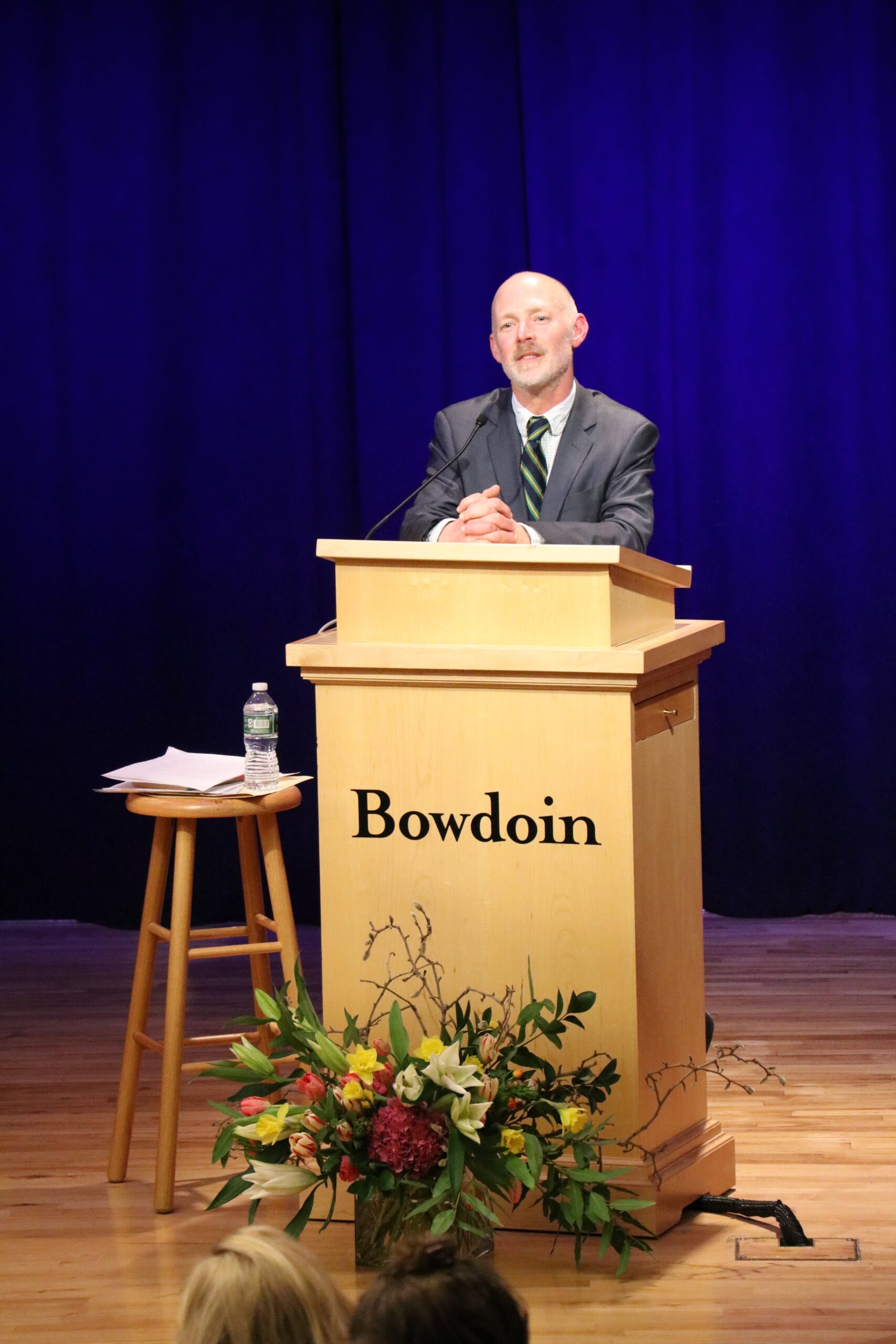Brock Clarke delivers Greason inaugural lecture
March 1, 2019
 Ezra Sunshine
Ezra SunshineLast night, Bowdoin students, faculty and community members huddled together in Kresge Auditorium to listen to Professor of English Brock Clarke’s inaugural lecture as the A. Leroy Greason Professor of English.
Clarke’s talk, titled “What the Cold Can Teach Us,” focused less on inclement weather itself but instead on Clarke’s own experiences and obsessions and their influence on him as a writer.
“The cold, the climate cold, has to do with where I grew up, which is a small town in way upstate New York. It’s frozen half the time, and it’s generally considered an unlovable place,” said Clarke. “But there are things embedded in it that I find lovable, not because in fact they are lovable, but because they’re interesting to me as a writer.”
To Clarke, these lovable details aren’t simply the “generic things” that connect people to a place, such as family or relationships there; rather, these details are often overlooked or even dismissed out of hand as backwards.
“What matters to me are these things that are exactly what people don’t like about the place,” Clarke said in an interview with the Orient. “So this is me making an argument for writing about things other people deem not to be important, like a tiny shithole mill town in upstate New York. So, I think that partly manifests itself in my writing.”
This focus on making the naturally unlovable lovable manifested itself during the lecture, when Clarke repeatedly poked fun at his hometown’s small claims to fame. He referred to how his town’s public relations efforts sometimes seemed self-deprecating and humorous and how these small details, which often seemed absurd, actually made the town more lovable and important to him and his writing.
This absurdity and these mundane details are important to Clarke and his writing style. During the lecture he mentioned notable writers like Joy Williams and Paul Beatty and how they approach subjects in a “slantwise way” that shocks and disarms the reader.
A perfect example of this is in Clarke’s recent work, “The Price of a Haircut,” a collection of short stories that arose from his experiences in Cincinnati during race riots after a young black man was killed by a white police officer. According to Clarke, his publisher originally wanted him to write a nonfiction book about the riots, but he took another path.
“I thought, ‘How am I going to write this in a way that distinguished itself from other accounts?’” said Clarke in an interview. “So I turned it into this weird fable about a race riot being blamed not on racist cops, but on a racist barber who’s offering really cheap haircuts. And their response was like, ‘Who the fuck would do that?’”
It’s questions like these that make Clarke feel he’s onto something as a writer.
“When people asked that question, that’s exactly when I realized I was doing something that I wanted to do,” he said. “For me, if you’re doing it the same way other people are doing it, then you’re not quite living up to the potential of whatever art form you’re working in.”
For many who know Clarke, his inaugural lecture captured his personality, humor and originality.
“Brock has a lot of insight in writing and reading fiction, and hearing how he formulates his work is very interesting,” said Aleksia Silverman ’19, one of Clarke’s honors students. “In particular, I’m really interested about what he said about satire. Seeing how satire operates in today’s atmosphere and how you can use humor in your writing is great.”
The A. Leroy Greason Chair, named in honor of the College’s 12th president, was first awarded in 1999 to Professor Emeritus Mary K. Hunter of the Music Department. The Chair is an honor given to a professor who specializes in the creative arts. Clarke is the third professor to hold the professorship and the first to share the honor with another faculty member, A. Leroy Greason Professor of Visual Arts Mark Wethli.
Clarke said he was honored to receive the named professorship.
“I spent a lot of time just, you know, banging my head against whatever I’m working on by myself,” he said. “And so you’re never quite sure that it’s having an impact. So it’s nice when these things happen, it lets you know that at least someone thinks [your work] is having an impact.”

Comments
Before submitting a comment, please review our comment policy. Some key points from the policy: